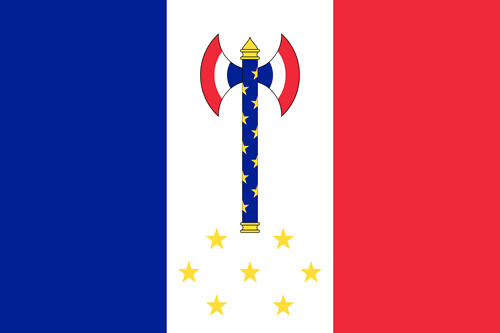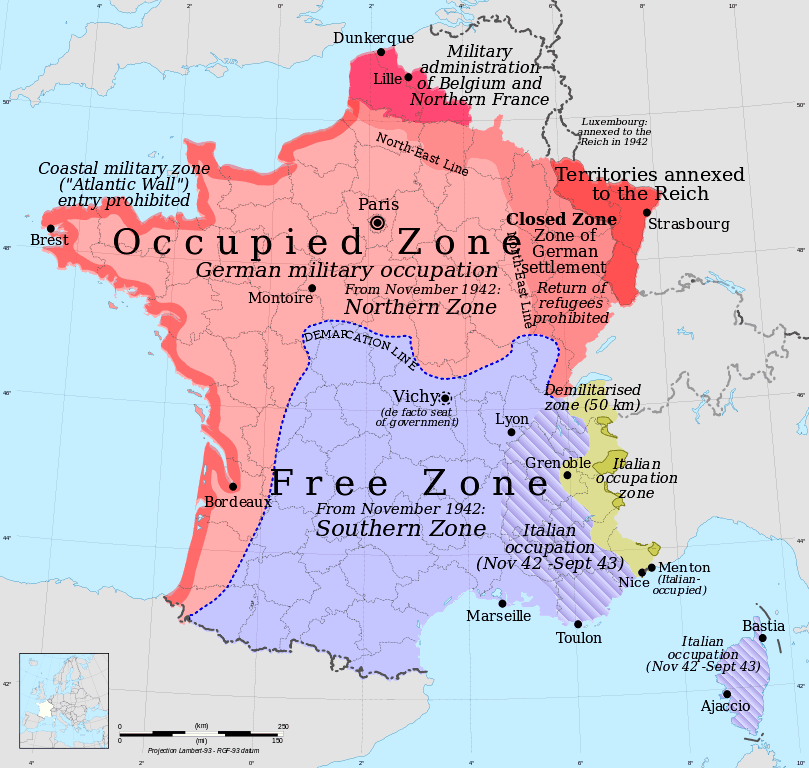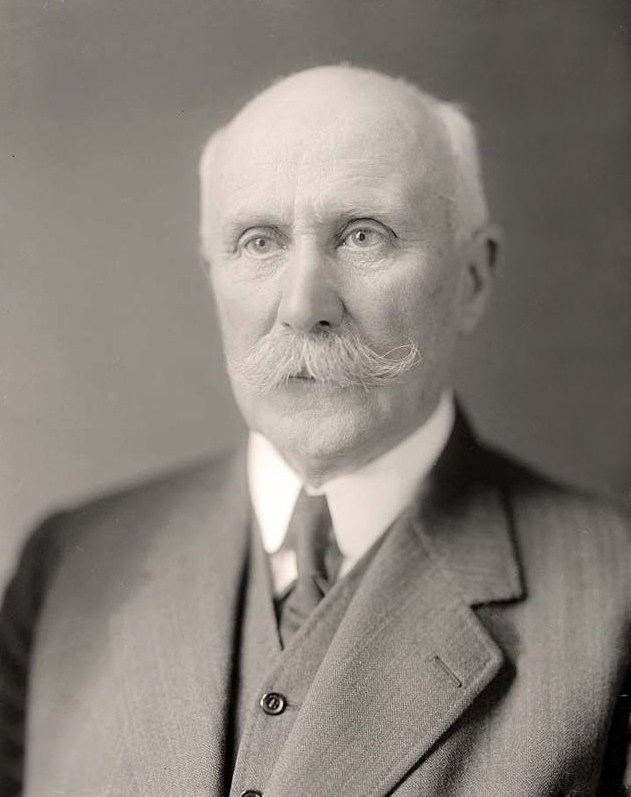 |
| Vichy France flag |
Vichy France is the name given to the right-wing, authoritarian government that succeeded the Third Republic after the fall of France to the Nazis in 1940. It was named for the French spa town to which many of its leaders fled after the occupation of Paris. The government immediately sought an armistice and an ill-defined "collaboration" with the Nazis.
Under the leadership of Marshal Henri-Philippe Pétain and Pierre Laval, the regime attempted to bring about what it called a "national revolution" for France to cleanse the nation of the decadence of the Third Republic and the humiliation of military defeat. Vichy ruled more or less autonomously over the southern, nonoccupied portion of France until late 1942, when the Nazis invaded this territory and brought it under the direct control of the Reich.
Even then, the Vichy government retained some control over governmental affairs and did not finally capitulate until weeks before the liberation of Paris. Even today Vichy is inseparable from its collaboration with the Nazis, in particular its complicity in the Holocaust.
The Vichy "national revolution" was a direct result of the fall of France in 1940, but its spiritual roots lay in the instability and perceived decadence that wracked the Third Republic. Many intellectuals and politicians blamed the Third Republic—and parliamentarianism in general—for a variety of political and social problems in the interwar period.
  |
The German Wehrmacht, fresh off their conquest of the Netherlands and Belgium, crossed the French border on May 13, 1940, and, despite the gallant resistance of some components of the French army, were in Paris a month later. The government of Premier Paul Reynaud, which had fled the city for Bordeaux on June 10, resigned and was replaced by a government headed by Marshal Pétain, a general and hero of World War I.
Full Governmental Power
Before this point, certain elements of the Reynaud government, backed by British prime minister Winston Churchill, had advocated withdrawing to either Brittany or French North Africa to continue the fighting. However, both Pétain and Pierre Laval were staunch proponents of an armistice and negotiated peace with the Germans.
That peace recognized the German occupation of most of the north and west of France, leaving Pétain's government in control of the south. Fervent resisters like Brigadier General Charles de Gaulle escaped to Britain, but the lion's share of French politicians and military leaders seemed resigned to the defeat. On July 4 the national assembly voted overwhelmingly to give Marshal Pétain full governmental powers.
 |
| Vichy France map |
Pétain and his colleagues set about the task of remaking and regenerating France. Though its approach was corporatist and very conservative in nature, and though it articulated itself in racial and quasi-scientific terms, it is important to note that the Vichy "national revolution" was not fascist per se.
Pétain was a devout Catholic who believed that France was being punished for a century and a half of corrupt republicanism and that the country needed to be saved. A full-fledged personality cult sprung up around Pétain, based primarily on his reputation as war hero, grandfather figure (he was 84 upon assuming full powers), and moral paragon.
This cult served a double purpose in the context of the war. To the Allies Pétain was the gallant old French patriot, he and his government providing the shield that prevented Adolf Hitler from occupying the rest of France and its empire.
 |
| Marshal Henri-Philippe Pétain |
To the Nazis he was the stern moralist and antiparliamentarian, seeking to help build Hitler's "New World Order" by cleansing France and purging her of "undesirables." This double game prevented either side from fully knowing what to make of Vichy until quite late in the war.
"National Revolution"
It was also meant to achieve some breathing room for Pétain to bring off his "national revolution," whose motto was "Work, Family, Fatherland." Legislation was passed that forbade women from working outside the home and made divorces much more difficult to obtain.
Compulsory military service was partially replaced by a youth work program that was meant to instill solid "peasant" values in France's young people. Further measures taken to reestablish an agrarian society included a system of subsidies allotted to small farmers, the organization of local agricultural syndicates, and a supposedly simplified scheme for dividing and distributing parcels of farmland.
   |
Finally, the "national revolution" demanded that France be purified of the "disease" of "outsiders"—a term that applied to freemasons and communists, but primarily to Jews. Exclusionary measures were passed that barred Jews—defined by the ethnicity of the father—from being government ministers, civil servants, doctors, or teachers.
Far more pernicious, however, was Vichy's collaboration with the Germans with regard to the Holocaust. Much has been made of the regime's eagerness to assist the Nazis by delivering France's Jews to the concentration camps on the eastern front.
An additional 55,000 to 60,000 Jews were interned in the unoccupied zone and in Algeria; these internments were thus not technically part of the Final Solution but an independent outgrowth of Vichy policy.
The historiography on Vichy has been less than unanimous on whether collaboration was forced on the regime by the Nazis or was an independent choice. The armies under Vichy's control fought at times as though they were allied with the Germans.
The most obvious example of this came during Operation Torch, the Allied invasion of North Africa in November 1942. The Allies had been led to believe by Vichy's commanders on the ground that Vichy's forces would allow the Allied landing.
Instead, although Vichy did not actually open fire on the Allies, Darlan delayed long enough in cooperating that word got to the Germans, who did resist the landings. The Allies eventually landed and signed an armistice with Darlan, but the Germans, enraged by Vichy's vacillation, invaded and occupied the unoccupied French zone shortly thereafter.
Historians have also disagreed on who was really the driving force behind Vichy—Pétain or Laval. It is a stated fact, however, that Laval was fired from the government several times from 1940 to 1944 (either by Pétain or later by the Nazis).
By contrast, Pétain's stint as the head of the government continued uninterrupted until finally, in July 1944, in the wake of the Allied advance on Paris, the Nazis removed him to Sigmaringen Castle on the German border. There Pétain sat as head of a rump Vichy government until after the liberation, when the marshal gave himself up to Allied authorities after refusing asylum in Switzerland.
Pétain, Laval, and other Vichy leaders were placed on trial in August 1945 in a decidedly downmarket version of the Nuremberg trials. At this trial Pétain claimed that, as the Allies had thought, he had been the only thing keeping the Nazis from occupying the whole country, that the purpose of Vichy was to stall for time, and that his government had only collaborated because they were forced to. "If I could not be your sword," he said famously, "I tried to be your shield."
These ministrations proved unsuccessful, however, and Pétain, Laval, and numerous other former Vichy leaders were condemned to death. Although Laval was executed, the marshal saw his sentence commuted to life imprisonment by General de Gaulle, who was now the head of the French provisional government.
The Vichy government's legacy for France has been murky at best. In the aftermath of the war, successive French governments propagated a myth created by de Gaulle himself, which asserted that Vichy was an aberration and that the vast majority of the French had been resistant from the start.
This myth had its political purpose, to be sure, but it kept the French people from accurately coming to terms with what had happened from 1940 to 1944 until many years later. Above all, France's reluctance to fully address Vichy's complicity in the Holocaust was probably the most disturbing legacy of a government born of humiliation and defeat.